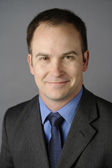Who You Gonna Call?: Exec Doc in Kazakhstan
August 30, 2011 - For two weeks in July, a group of Penn GSE students – all enrolled in the Executive Doctorate in Higher Education Management program – got a different take on the study abroad experience.
The group – 23 students joined by five Exec Doc faculty members – made their way to Kazakhstan to consult on the development of that country’s brand-new, Western-style, research university. Just over a year old, the university is the brainchild of Kazakh president Nursultan Nazarbayev, who wants to bring the country’s educational system into the 21st century.
 It wasn’t the first time that Penn GSE had lent its expertise to the new institution. In 2009, the government of Kazakhstan had turned to three Penn GSE experts – Professor Matthew Hartley, Exec Doc Director Blake Naughton, and Senior Fellow Alan Ruby – for essential advice about the nuts-and-bolts of running a major university. (For details about their work, click here.)
It wasn’t the first time that Penn GSE had lent its expertise to the new institution. In 2009, the government of Kazakhstan had turned to three Penn GSE experts – Professor Matthew Hartley, Exec Doc Director Blake Naughton, and Senior Fellow Alan Ruby – for essential advice about the nuts-and-bolts of running a major university. (For details about their work, click here.)
The university opened its doors in August 2010. But Nazarbayev U. is still in its infancy – its second “freshmen class” will matriculate this fall – and administrators are on a high learning curve.
This summer’s Exec Doc service-learning project was, as Naughton explains, “the epitome of engaged research.”
Serving as the “client,” Nazarbayev brought in the Exec Doc students as “research consultants.” Students in the program are all senior leaders in higher education with expertise in every segment of the enterprise – planning, finance, student services, enrollment management, faculty affairs, community partnerships, etc.
Their deliverable needed to serve two purposes: it had to address the immediate challenges facing the new university itself while also providing a larger road map for the system of higher education as the country engages in deeper reform.
More than a simple consulting report, the final product was a series of research reports about how to translate best practices from the U.S. system into the Kazakh context. “Since each cohort has great expertise in running different segments of the enterprise,” Naughton explains, “we divided them into groups that reflected the four constituencies of the university: students, faculty, administrators, and the community.”
Before flights were even booked, the Exec Doc teams had immersed themselves in background research on the Kazakh context as well as best practices. In country, they met with officials from Nazarbayev and other universities, government agencies, and NGOs to get a picture of needs and appropriate practices for Kazakhstan.
The visit culminated in a national conference where the student teams presented key findings both for Nazarbayev and for other universities that will, in the near future, be adopting this model for higher education.
In their recommendations, the teams emphasized the value of experiential learning for students, faculty, and community; the importance of developing students’ critical thinking skills; and the need for the university to engage with the community and to conduct research that addresses social needs.
Those findings have been written up in a series of final reports, due for publication this fall.
For Naughton, the project had other, perhaps less tangible deliverables – ones that produced important benefits for the students. On a practical level, the experience served as a kind of “dry run” for students’ dissertation work.
“Not only did the research process give our students the opportunity to conduct active research,” he says, “but we were able to observe them in action, and coach them on conducting qualitative research. It’s been a great exercise for them that will help them in as they go about conducting their own research.”
Beyond that, however, Naughton sees a deeper value to the kind of international service-learning the Exec Doc program pioneered this summer.
Study-abroad programs all too often run the risk of being “academic tourism” that provides only a cursory view of another culture. But in their role as researchers, the Exec Doc students had to understand the Kazakh context and forge significant connections with their international counterparts.
And that experience, says Naughton, “pushed them to reflect on their own experiences and to test their own assumptions – and to learn what globalization really means.”
